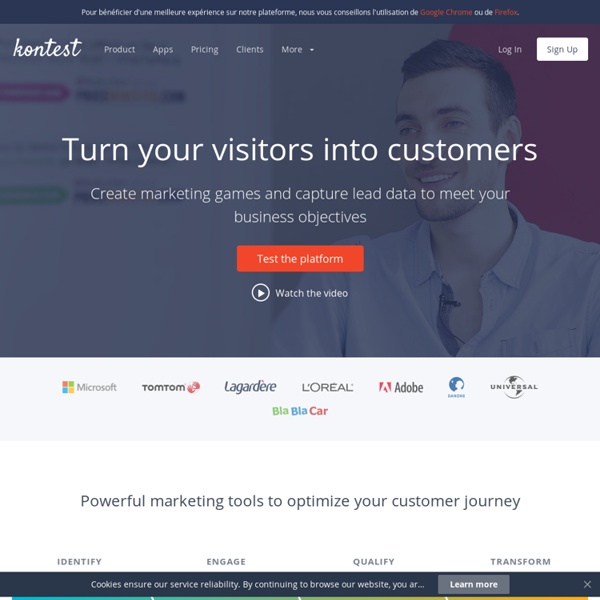



Defining “Engagement” I’m into this whole defending terms and definitions crusade as I believe it defines where we go from here. Don’t use that term until you know what they mean That term Engagement sure appears to be thrown around recently, (and I’m not talking about Cap’n Jean-Luc Picard) with a wide variety of use and understanding. Honestly, it scares me quite a bit. Some highly criticize this term as it’s being pushed by the advertising industry to move into this space. That’s bull crap, because we did a study ourselves (none if few were advertisers) at a a recent roundtable, and it scored as the top ‘wanted’ attributed to be measured, for whatever that’s worth. Définition Taux d'engagement Facebook Le taux d’engagement Facebook est un indicateur destiné à mesurer la propension des fans d’une marque à interagir avec celle-ci. Le taux d’engagement Facebook peut être mesuré de différentes façons selon les différentes solutions de web analytique utilisées ou selon l’évolution des indicateurs fournis directement par la plateforme Facebook. Le taux d’engagement peut se mesurer pour la page de marque et pour une période donnée ou être uniquement relatif à une publication de la marque vers ses fans.
How do you calculate engagement? Part II Given that my last post on measuring engagement generated a fair amount of feedback, I wanted to follow-up with the post that in retrospect I should have published first, the nuts and bolts behind the engagement calculation. Since there are numerous definitions of “engagement” that could be applied to the online channel, I choose to use the following definition: Engagement is an estimate of the degree and depth of visitor interaction on the site against a clearly defined set of goals. My definition sounds like conversion rate except engagement is a more flexible concept, one that can accommodate a variety of business needs such as those described by Bill Gassman in his comments to my last post and those of Craig Danuloff who is looking for a metric that accommodates a variety of visitor activities. Based on my knowledge of my site visitors and their long-term usage patterns, my engagement goals are as follows: Now, many of you will likely argue with these criteria, and fairly so.
Le Retour sur Engagement (ROE), jumeau caché du ROI Nous vous proposons aujourd'hui, une reflexion sur le ROE, aka Retour sur Engagement, par Grégoire Peuvion (BRANDCASTERZ) Evaluer une campagne en maniant le seul ROI, c’est comme réduire Paris à la Tour Eiffel : C’est gros, c’est évident, c’est tradi… Mais ça ne fait pas tout. Oui, car le ROI c’est du beau quanti qui pourtant ne saurait suffire alors que toutes les officines échafaudent à propos de l’engagement. Cet engagement du consommateur envers la marque témoigne en effet d’un mode de relation centré sur l’imaginaire, l’émotionnel, et donc l’affectif. Tout ce que le ROI ne mesurera jamais.
Breaking Down Facebook’s “Talking About This” Metric. Facebook’s “People Talking About” – What Does It Mean? Last October, Facebook introduced the “People Talking About This” metric as part of its Insights offerings – but many people don’t even know what it means. Let’s see if we can’t end the mystery. In short, “People Talking About” measures the number of unique users who have created a “story” about a page in the past week. A story can be anything that can appear in a user’s News Feed, for example: • Likes • Wall posts • Post Likes • Comments • Shares • Question answers • RSVPs • Page mentions (using the @ tag) • Photo Tags • Check ins • Recommendations
What is "Talking About This" on Facebook Pages? Facebook recently overhauled their Insights dashboard for page administrators (details about that here – PDF) and in the process added a new metric to brand pages called “people talking about this.” Facebook defines this metric as “the number of people who created a story about your page” in the last 7 days. Since that’s considerably less elegant and easy to understand than “like,” here’s what it really boils down to: The “people talking about this” metric is the number of people in the last 7 days who created a story in their NewsFeed/Timeline related to a particular page by doing one or more of the following: Liking the pagePosting on the page’s wallLiking, commenting on or sharing a post, photo or video from the pageAnswering a question posted by the pageRSVPing for an event created by the pageMentioning the page in a postTagging the page in one of their photosChecking in to the page’s location…and possibly a handful of other things. Good or Bad?